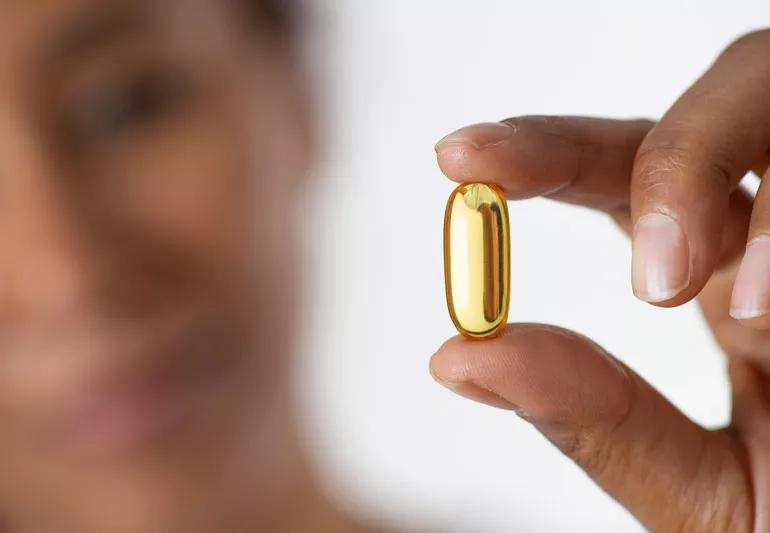Research shows that high doses of vitamin D do nothing to lower your cardiovascular risk

Image content: This image is available to view online.
View image online (https://assets.clevelandclinic.org/transform/08a876f0-c385-44e4-93e7-f0be212de501/vitamin-D-capsule-In-Hand-1217639670-770x533-1_jpg)
closeup of person holding vitamin d gel capsule between fingers.
Everyone wants a magic pill when it comes to better health. So, when observational studies showed that people with higher levels of vitamin D had lower rates of heart disease, interest in vitamin D supplements jumped.
Advertisement
Cleveland Clinic is a non-profit academic medical center. Advertising on our site helps support our mission. We do not endorse non-Cleveland Clinic products or services. Policy
It makes sense, right? If vitamin D can prevent cardiovascular disease, getting a high dose of it from supplements should help your ticker.
Unfortunately, heart health isn’t that easy. Let’s learn more from cardiologist Steven Nissen, MD.
Vitamin D carries a well-earned reputation as a powerhouse nutrient. It helps your body absorb calcium to boost bone health. Vitamin D also supports your immune system and nervous system and can reduce inflammation in your body.
If your body doesn’t get enough vitamin D … well, it seems like problems often follow. Low levels of vitamin D seem to coincide with a wide range of health conditions — including heart disease.
But while there appears to be some sort of relationship between vitamin D and your heart, research shows that erasing cardiac concerns isn’t as simple as popping a vitamin D supplement.
A study released in 2017 shows that taking monthly high doses of vitamin D supplements does nothing to prevent cardiovascular disease. That held true even if participants started with a vitamin D deficiency.
Those results are in line with other assessments about dietary supplements and heart health: “This is yet another study showing that vitamins and dietary supplements have virtually no benefits in preventing heart disease,” notes Dr. Nissen.
Advertisement
In fact, the U.S. Preventive Services Task Force says there’s insufficient evidence to recommend that adults take vitamin D or any other supplement to prevent cardiovascular disease.
When it comes to vitamin D and your heart, it’s possible to have too much of a good thing.
Excessive amounts of vitamin D can lead to off-the-charts levels of calcium in your blood, a condition known as hypercalcemia. That can increase your risk of coronary artery disease (CAD), as calcium deposits build on blood vessel walls.
CAD can set the stage for a heart attack or congestive heart failure as time passes.
High levels of vitamin D in your system can also lead to kidney failure, kidney stones and bone-related issues such as osteoporosis, among other issues. (In other words, it can be serious if not addressed.)
Given all of that, Dr. Nissen urges caution with vitamin D supplements. He says it’s always best to talk with a healthcare provider before starting any supplement routine.
Despite what you may read online under clickbait headlines, there aren’t any miracle pills or easy shortcuts to better heart health, emphasizes Dr. Nissen. (It’s a question he gets asked a lot, though.)
So, what can you do? He suggests focusing on building healthy lifestyle habits to keep your heart happy.
“Exercise, eat a healthy diet, manage your body weight and watch your cholesterol and blood pressure for any signs of trouble,” he advises. “Do that, and you’ll be way ahead of the game.”
Advertisement

Sign up for our Health Essentials emails for expert guidance on nutrition, fitness, sleep, skin care and more.
Learn more about our editorial process.
Advertisement
The ‘sunshine vitamin’ is found naturally in some fish and is added to other foods
In general, you want to take this ‘sunshine vitamin’ with a meal or snack that contains healthy fats
Vitamin D is an umbrella term for both D2 and D3 — both help keep your bones and immune system strong
The benefits of vitamin D include stronger bones, a hardier immune system and better overall health
If you’ve been diagnosed with breast cancer, having a normal range of vitamin D can help
They claim to boost energy and improve longevity, but there’s currently not enough research to confirm these benefits
Certain supplements, like licorice root and St. John’s wort, can raise your blood pressure or negatively interact with medication
Age, sex and genetics are just a few factors that can affect your risk of developing coronary artery disease
Although it could be used as a moisturizer, this new trend is not recommended
Communicating clear limits helps protect your time, energy and emotional well-being
High cholesterol can be genetic, but testing and treatment can lower your heart disease risk